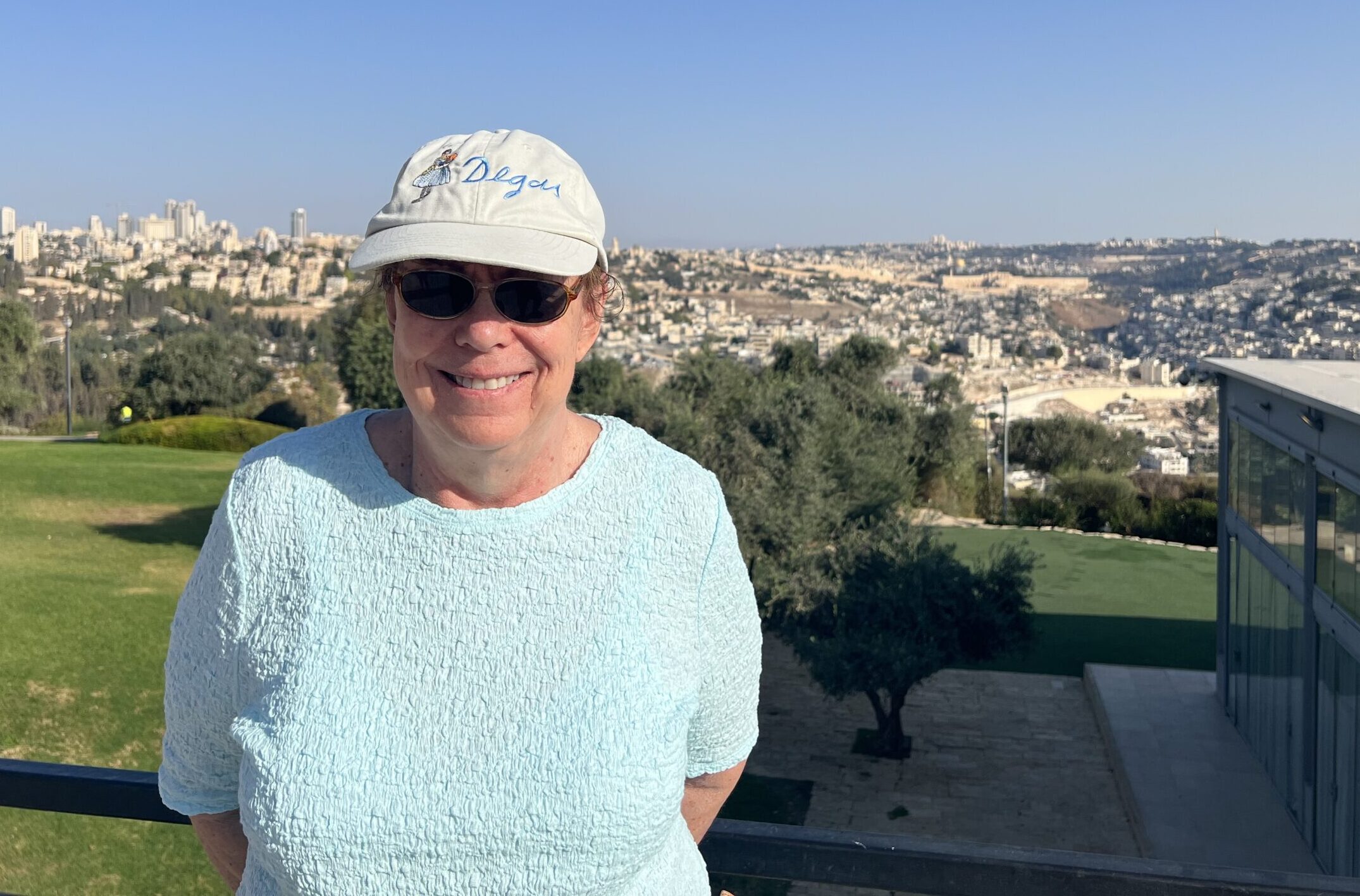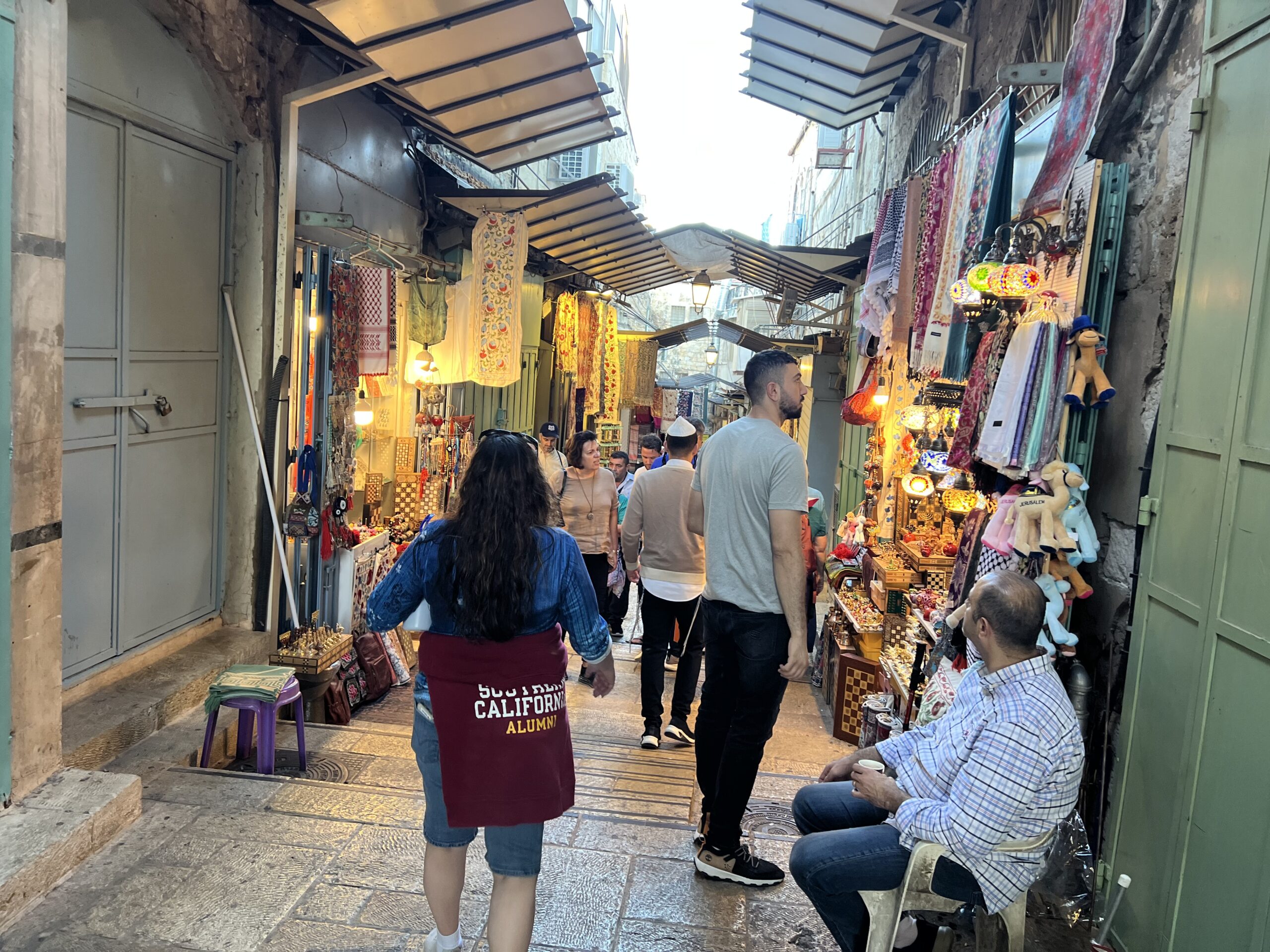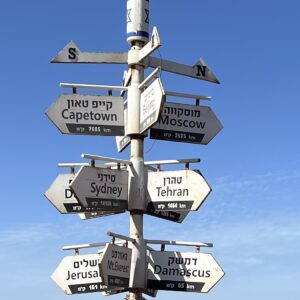When President Donald Trump finishes his second term, he might want to run for office in Israel.
Most Israelis I spoke with shortly after Hamas released 20 hostages were ecstatic over Trump’s role and hopeful a cease-fire with Hamas would hold. A September poll found that 53 percent of the Israeli public supported Trump’s plan, 17 percent opposed it and 30 percent were undecided.
At the Vert Dead Sea Hotel in Ein Bokek, a group of five older Israelis bathing in the Dead Sea were enthusiastic Trump supporters. All five, from the Tel Aviv area, also backed Prime Minister Benjamin “Bibi” Netanyahu. One man said both Netanyahu and Trump were “strong leaders,” which he argued was necessary to confront Hamas and Iran. He cited joint U.S.-Israeli strikes on the Islamic Republic aimed at crippling its nuclear program.

Reporter Linda Stein with Jerusalem in the background.
(CREDIT: Linda Stein)
They volunteered that former President Barack Obama had been “bad” for both America and Israel. Asked about President Joe Biden, one woman called him “a marionette with Obama pulling the strings.”
Other Israelis who praised Trump were more critical of Netanyahu. As American voters blamed Jimmy Carter for the Iran hostage crisis in 1979–81, some Israelis fault the current prime minister for failing to prevent the horrific Oct. 7, 2023, Hamas terror attack that resulted in roughly 250 hostages, 1,200 deaths and a prolonged war in Gaza.
The conflict devastated Israel’s tourism industry. Many travelers feared visiting the country or objected to the war after waves of negative publicity and campus protests.
Israel — a spiritual center sacred to both Judaism and Christianity — recorded $8.4 billion in tourism revenue in 2019. But when airlines suspended service during the Gaza war, that revenue nearly vanished.
One tour guide said that although he managed to lead at least one group a month during the fighting, he rarely saw fellow guides for nearly two years. Some left the profession entirely. One former guide told me he became a taxi driver, earning far less but needing to support his family.
Across the country, hotel and restaurant staff warmly thanked American and Canadian tourists. Small business owners did the same, repeatedly expressing gratitude to customers simply for walking through their doors. In Jerusalem’s Arab Quarter — its narrow alleys packed with shops selling rugs, art, jewelry, T-shirts and hookahs — vendors enthusiastically tried to draw passersby inside.
“Special! Half price. Just for you!” one merchant called out.
In the northern city of Safed, known for its artists, a jewelry maker said few visitors bought his pieces during the war years. Now, he said, he was grateful to see tourists again.
Asked about the recent hostage release and which politician deserved credit, he gave neither Trump nor Netanyahu the nod.
“It was God who brought the hostages home,” he said. “Working through the politicians.”
Nearby, Jewish artist Abraham Loewenthal welcomed visitors into his Safed studio and spoke about Kabbalah, Jewish mystical teachings. He believed divine intervention was visible in recent history — from Israel’s founding in 1948 and the return of Jews exiled since 70 C.E. to what he described as Trump’s miraculous survival of an assassination attempt.
In the Golan Heights, a 35-year-old farmer who served 400 days in the Israel Defense Forces during the Gaza war listed multiple causes of Oct. 7, including insufficient manpower in southern Israel and intelligence assumptions that such an attack was unlikely.
He also noted that European powers drew Middle Eastern borders without regard to ethnic realities. With Syrian President Bashar Assad’s rule collapsing, he said, Israel has stepped in to protect Christian and Druze minorities from Islamist forces.

A narrow alleyway in the Arab quarter in Jerusalem.
(CREDIT: Linda Stein)
Unlike most people I interviewed, he was pessimistic — and said many Israelis felt the same.
“Israelis cannot really trust the Palestinians,” he said. “Let’s say Judea and Samaria, the West Bank. If 70% of the people in the West Bank support Hamas’ actions on Oct. 7? A lot of Israelis have a lot of doubt. Before Oct. 7, I would say about 45% of Israelis believed in the two-state solution. Today less than 17% do.”
In past decades, he said, Palestinians were offered a state “many times,” and the Palestine Liberation Organization turned it down. “I am a right-winger but not religious at all… Socially, people are 50/50 here. But when you talk about security, most Israelis are right-wingers because of what happened Oct. 7.”
“If you go and talk with leftists, they will be very militant toward the Palestinians today,” he said. “Israel lost faith with the whole Palestinian project.”
And in today’s climate, he added, ideology matters less than one man.
“Some right-wingers and left-wingers despise Bibi,” he said. “Right and left don’t mean anything. Are you pro-Bibi or against Bibi?”

